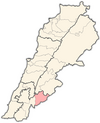|
Kfar Shouba, Hasbaya
Kfar Shouba (Arabic: كفرشوبا), also known as Kfarshouba and Kafr Shuba, is a municipality in the Hasbaya District of the Nabatieh Governorate in Southern Lebanon. The people of the village are Sunni Muslims. It is situated in the region of Arkoub, at 1256 m above sea level and 130 km from Beirut. Located near the border of Israel and the Golan Heights, not far from the Shebaa Farms, it overlooks in depth both Israel and the Lebanese Bekaa, which makes it a strategic military location. HistoryThe village was occupied by Israeli troops during a punitive mission, in the wake of PLO attacks inside Israel, on the 26 of February 1972,[1] and was devastated by a major Israeli attack conducted in January 1975.[2][3] It was bombed and rocketed by Israeli warcraft further on 15 June, and shelled again by Israeli artillery on 31 August, of that year.[4][5][citation needed] The mosque in the village was destroyed by Israeli artillery in 1972 but partially rebuilt. It was struck by Israeli air raids and artillery fire in April 2002 after Hezbollah fired rockets at Israeli army positions in the occupied Shebaa Farms.[6] In retaliation for a Hezbollah retaliatory strike against an Israeli patrol on the 28 January 2015, the village was shelled by IDF artillery fire, together with the two other border villages of Majidiyeh, Abbasiyeh.[7] Kfar Shouba is the second largest village in southern Lebanon, which also contains the largest number of young graduates in the Caza of Hasbaya. The Lebanese Army, as well as Hezbollah, say that Israel is still occupying the general area in which the village is located, known as the Kfarshouba Hills.[8][9] It stands in mountainous terrain. According to a video posted by the Alma Research and Education Center rockets were fired from a high school in the village during the Israel–Hamas war in October 2023.[10] Landmarks
DemographicsIn 2014 Muslims made up 98.15% of registered voters in Kfar Shouba. 94.34% of the voters were Sunni Muslims.[11] Large families and notables
AgricultureKfar Shouba farms produce olives (over 100 tonnes in 2006 including olive oil),[dubious – discuss] figs, grapes, and cherries. References
External links
|
||||||||||||||||||||||||||||||||

